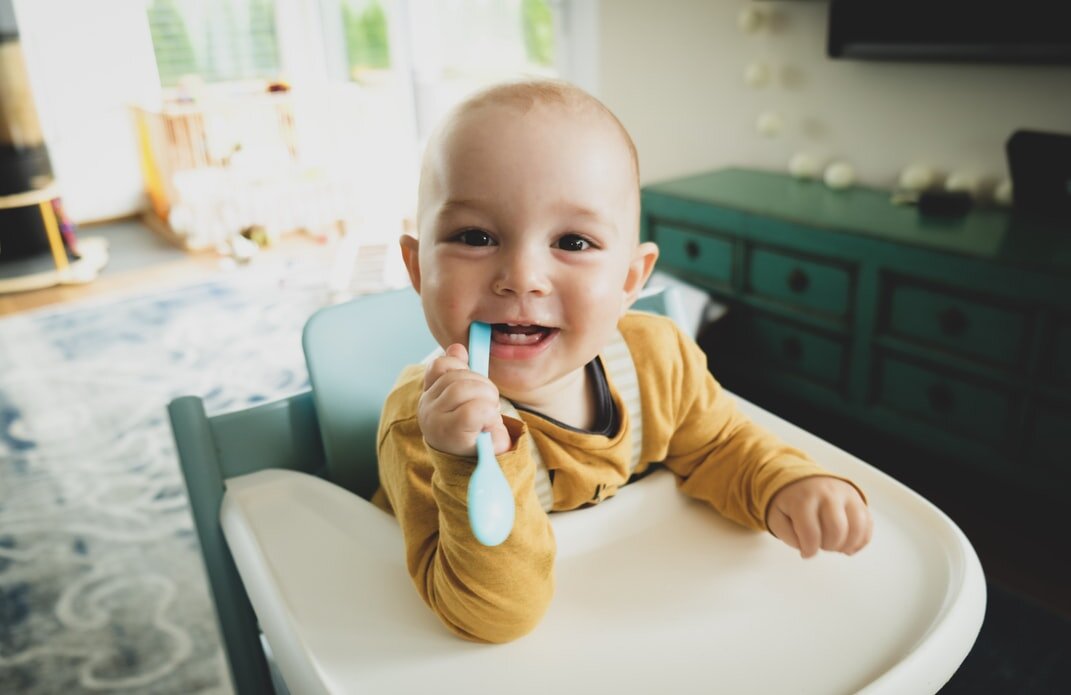Encouraging your baby to self-feed at 10 to 12 months by Esmé Gelder
Your little ones are more likely to be developing into an experienced eater by the time they are almost one year old! Your toddler can now sit comfortably in the high chair and will be using their hands a lot more. At that age, your little one would have mastered the so-called ‘pincer grasp’ - they can now hold small items between finger and thumb. When your baby starts to reach for the spoon to help get the food in... you should bear in mind that with this new skill, the baby starts to say refuse the food very often, or even throw the whole prepared food on the floor.
This can be a very challenging stage, but it's an important one, you have to encourage your baby to feed themself with their fingers or by using a spoon. Understandable, that your little one won't eat always much, but it's a great way to teach them independent eating skills because those will serve them in the future as their skills and palette grow too.
Self-feeding with cutlery
When you start encouraging your toddler to self feed, one of the best ways is to use sticky foods like oatmeal or mashed potato. This is one method that will cling the food to the spoon and can make it easier for the baby to get a mouthful before it all slides off.
Filling the spoon and then offering it to the baby is one of the ways you can encourage self-feeding.
Try to relax, as their sense of achievement for feeding themself will outweigh his inconvenience of taking casseroles of the board or wall; making all the place mess is a stage you can't avoid.
If you are being concerned that your little one is not eating that much, try using two spoons, one for them to hold, and one for you to load the food while they are trying to eat by themselves from the bowl.
When you are trying to teach your baby to be familiar with cutlery - the chunkier and clunkier the better. Even if your baby doesn't want to feed themself, they will love to chew the spoons.
While some parents prefer to use a long spoon to feed the baby, a shorter one with an angled head will make it easier to feed them.
One thing you should know is that you need to choose child-friendly bowls for the feed. A bowl with a sucker on the bottom will stick to the high chair and can make it easy for the baby to get their food without having to chase the dish around. This is also a perfect idea to limit the throwing of the bowl or plate when they get annoyed and bored!
Finger foods for self-feeding
Now that your baby has more teeth, finger foods can really come in handy at this point. Now your baby has more teeth and better reflex skills, that means it’s time to start introducing them to a wider variety of flavors and textures. Crunchy foods like breadsticks, toast, rice cakes, and cereals are ideal food for your baby. You can also try to feed the baby with cucumber sticks, meatballs, cooked pasta, and even fish fingers. As your baby gets better at feeding themself, you may be able to introduce them to a daily finger food meal.
Using a cup
Many experts recommend removing your baby off bottles at around 12 months to avoid damaging his teeth - so, at this stage, it’s a great idea to make sure you teach your baby to use a cup to drink water or milk. There are a lot of options to choose from with baby friendly features. You may need to try different kinds before you find one that your baby can drink from easily.
Good role modeling
The best way to encourage your little one to feed themself, you have to eat together as a family - this way, they could have a chance to see others using cutlery, and may encourage them to be like Mummy, Daddy or their siblings. Sharing mealtimes is fun, and babies are somehow 'forced' to choose up on what everyone else is doing and eating.
Esmé Gelder has dreamed of being a pediatrician since she was a little girl making rounds with her mother. She grew up in St. Louis and then she received her medical degree from St. Louis University School of Medicine and completed her pediatric residency at Cardinal Glennon Children’s Medical Center. She loves helping children to become more independent by developing critical skills such as social, communication, and daily living skills.


